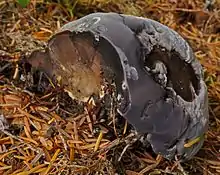| Hydnellum regium | |
|---|---|
 | |
| Scientific classification | |
| Domain: | Eukaryota |
| Kingdom: | Fungi |
| Division: | Basidiomycota |
| Class: | Agaricomycetes |
| Order: | Thelephorales |
| Family: | Bankeraceae |
| Genus: | Hydnellum |
| Species: | H. regium |
| Binomial name | |
| Hydnellum regium K.A.Harrison (1964) | |
Hydnellum regium is a tooth fungus in the family Bankeraceae. Found in western North America, it was described as new to science in 1964 by Canadian mycologist Kenneth A. Harrison, who reported collections from Oregon, Idaho, and Colorado. It fruits singly or in groups under pine and spruce trees.[1]
Its purple-black fruitbodies are large, forming complex rosettes measuring up 25 cm (10 in) wide by 15 cm (6 in) tall. The spore print is brown. Its spores are roughly spherical, tuberculate (covered with rounded bumps), and measure 4.5–6 by 3.5–4.5 µm.[2]
References
- ↑ Harrison KA. (1964). "New or little known North American stipitate Hydnums". Canadian Journal of Botany. 42 (9): 1205–33. doi:10.1139/b64-116.
- ↑ Phillips R. (2005). Mushrooms and Other Fungi of North America. Buffalo, United States: Firefly Books. p. 320. ISBN 978-1-55407-115-9.
External links
This article is issued from Wikipedia. The text is licensed under Creative Commons - Attribution - Sharealike. Additional terms may apply for the media files.